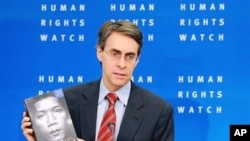Western democratic governments are failing to confront global human-rights violations, according to the international organization Human Rights Watch.
"Democratic and generally rights promoting governments are failing to put enough pressure on governments where there are egregious human-rights abuses taking place." Tom Porteous, director of the London office of Human Rights Watch, said.
The report names key international figures that it says are failing to champion democracy such as United Nations secretary general Ban Ki-moon, European Union foreign policy chief Catherine Ashton, and U.S. President Barack Obama.
Porteous says those who have traditionally championed human rights are relaxing their attitudes and that is in part because of a changing world order.
"We are living now in a multi-polar world where Western democracies are seeing their influence decline because of economic and political reasons, but also we have seen Western democratic countries themselves get involved in some pretty serious human-rights abuses over the past 10 years and therefore their legitimacy and their confidence as promoters of human rights are on the decline," he said.
He says, for example, that counter-terrorism measures in the United States and across Europe have led to human-rights abuses.
And in Europe, he says, discrimination against minorities has been a growing problem. In the past year a number of European nations cracked down on their Roma or gypsy populations - a move that was widely criticized by human-rights groups.
The group has listed Iran, Myanmar, North Korea, Yemen, and Zimbabwe among the most abusive governments.
In China, he says, major human-rights abuses are taking place, but Western democracies are failing to push for change. "Partly because China has become such an important global player politically and economically there has been a real cowardice when it comes to the West's confrontation of the human rights crisis in China," he stated.
In Africa, Porteous says Rwanda and Ethiopia have in recent years been heading towards increased repression.
But because Western countries have close links to their governments, they have turned a blind eye to abuses.
"I think because of this huge investment in development assistance in those countries there is a reluctance to confront the fact that the human-rights situation is getting worse," Porteous added.




